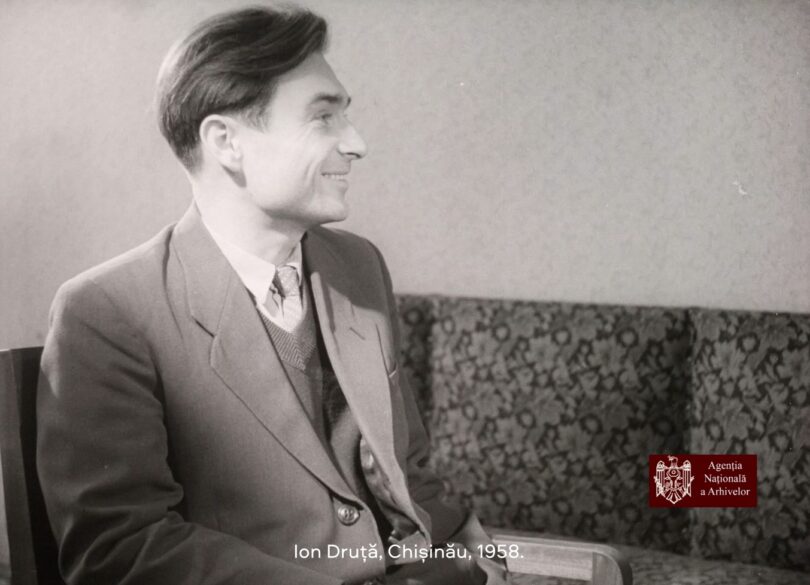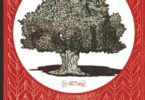Born in the village of Horodiște on September 3, 1928, Ion Druță dedicated his literary career to representing the lives of Moldovan peasants on the page and on the stage. Over the course of his life, he became known across the USSR as the quintessential Soviet Moldovan writer. His dedication to his particular vision of Moldovan life caused him to clash with the political and literary establishment, first with communists and later with nationalists. Recalling Druță’s pugnacious attitude in a meeting with Communist Party ideological officials in the 1960s, Zoia Iakhontova, Druță’s editor at the publisher Molodaia gvardiia, wrote that he was always “spoiling for a fight, preferring to meet danger face to face.”
Druță spent his youth in the village of Ghică Voda in northern Moldova in what was then the Kingdom of Romania. Soviet rule brought both tragedy and opportunity to Druță’s life. He was secretary of his village soviet in Ghică Voda during the devastating artificial famine in Moldova in 1946-7, which took the lives of many of his fellow villagers. Druță never forgot the experience of compiling lists of the starving, running from office to office to get the proper stamps in order to receive food aid from the government. Druță later wrote that it was only after he was mobilized into the Soviet Army in 1947 that he finally held a piece of bread in his hand and got a proper night’s sleep.
Homesick for his native village, Druță spent his evenings in his regiment’s library. With the help of an army commissar, Druță began to educate himself, expanding on the narrow seventh grade education he had received in a Romanian school. He began writing, and eventually his poems got into the hands of Andrei Lupan, a prominent poet and former underground communist activist who shared Druță’s rural background. Lupan helped Druță secure a position as a journalist and get established in the Soviet Moldovan literary world.
Druță published his first collection of stories about life in the Soviet Moldovan countryside, La noi în sat, in 1953. His stories, which told about the loss of the traditional peasant way of life, clashed with the official Soviet narrative that the USSR had brought only enlightenment and progress to the Moldovan village.
This put him on the wrong side of the Stalinist literary bureaucrats who dominated the Moldovan Writers’ Union at the time. In 1954, Druță shocked the literary establishment when he defeated a leading party official to win a seat on the board of the Union of Writers. He soon found himself blacklisted in retaliation, unofficially barred from publishing his latest work, Leaves of Sorrow, in his native republic.
Once again, Lupan came to Druță’s aid, this time by securing him a seat in the Higher Literary Courses at the Gorky Literary Institute in Moscow in 1955. The courses were designed to bring writers from the Soviet periphery to Moscow to study for two years. Druță was impressed by the lively atmosphere of Thaw-era Moscow, where cultural life was gradually reviving after decades of Stalinism. He particularly loved the theater, which, as he told me in an interview in 2017, inspired an almost cult-like intensity in its adherents.
In 1960, Druță wrote a play, Casa mare, about the life of a war widow in a Moldovan village, but once again found himself unable to publish in his native Moldova. He convinced the Moscow journal Druzhba narodov to publish it, and the play soon became a major hit for the Theater of the Soviet Army in Moscow. (When I conducted research on Druță at the Library of the Union of Theater Workers in Moscow in 2017, a staff member still remembered fondly the first time she saw the play.) The success ofCasa mare angered Communist Party authorities in Chisinau, who viewed it as a “kulak” play glorifying an obsolete rural way of life, but their angry letters to Moscow were largely ignored.
In the 1960s, Druță began writing novels that chronicled the recent history of Moldovan peasant life. It was a speech at the 1965 Congress of the Union of Writers of Moldova, however, that destroyed Druță’s already tenuous relationship with the political and literary authorities in Moldova. In his speech, Druță called for a return to the Latin alphabet in Moldova, “which naturally befits a language of Latin origin.” The positive reaction in the hall surprised even Druță.
After the speech, the head of the Communist Party of Moldova, Ivan Bodiul, criticized “nationalist” tendencies among Moldovan writers and summoned the offending writers to the Communist Party headquarters. On the way, the head of the Moldovan Writers’ Union Ion Ciobanu delicately suggested to Druță that it was time for him to leave the republic and settle in Moscow. Druță spent the entirety of the Brezhnev era in exile from his native Moldova. He was joined there by some of Soviet Moldova’s most prominent intellectuals, including Emil Loteanu and Ion Ungureanu, who likewise fled the repressive cultural policies in Chișinău.
The Moldovan authorities permitted the Moldovan State Prize Committee to grant Druță a State Prize for literature in 1967. But Druță’s next literary work, 1968’s Burden of Our Kindness, ensured that he would never again win a prize in Soviet Moldova.
Burden of Our Kindness was one of only a handful of Soviet literary works to discuss Stalin’s artificial famines before glasnost’. “Working as the secretary of a village soviet, at the age of seventeen I recorded the deaths of nearly a third of my fellow villagers,” wrote Ion Druta in a 1973 samizdat open letter about Burden of Our Kindness. “And the moral norms by which my ancestors lived and by which I try to live do not allow me to walk by the graves of my fellow villagers pretending that I do not know who, when, and under what circumstances they were buried there.” In the novel, Druță implied that the Soviet state had hoarded grain during the 1946-7 famine. “Behind the warehouses of the Pamyntenskii train station for two years great mountains of corn cobs rotted under the rain, but this corn was as far from them [the peasants] as God himself,” he wrote.
Burden of Our Kindness won praise in Moscow, and Druță was poised to win a USSR State Prize for Burden of Our Kindness in 1969 when the Moldovan authorities made it clear that they categorically opposed Druță’s nomination. Lupan, a State Prize committee member, tried in vain to salvage his protégé’s nomination, explaining in a passionate speech what many Moldovan writers knew to be true—that the Moldovan Communist Party sought to sabotage Soviet Moldovan culture.
Druță would never win a USSR State Prize, but he continued with a string of successful works in the 1970s, including Birds of Our Youth (1972), The Aroma of Ripe Quince (1973), Holy of Holies (1977), The White Church (1982). Moldovan Communist Party leaders seemingly never tired of writing aggrieved letters about Druță to Moscow but were unable to convince capital-city officials to muzzle their rebellious writer. Druță’s 1970s works reflected a growing sense among Soviet writers that Soviet officials had lost their way, becoming more fixated on material values at the expense of the spiritual values found in tradition, history, and culture. Like many Russian Village Prose writers, Druță argued for the importance of preserving historic churches, advocating the preservation of the Căpriana monastery in The Aroma of Ripe Quince. Along with many other Moscow intellectuals, Druță became increasingly attracted to Christianity over the course of the 1970s.
Mikhail Gorbachev’s rise to power opened up a new era in Druță’s career, during which he became an activist and elected official. When Gorbachev first launched his policies of glasnost’ and perestroika, the exiled Druță became a symbolic figure to the beleaguered Moldovan writers, who remained under a repressive, Brezhnevite regime headed by Semion Grossu. In 1987, the Moldovan Writers’ Union overthrew their previous leadership and elected Druță in absentia as their honorary leader. That summer, Druță wrote an explosive article in Literaturnaia gazeta criticizing the Moldovan leadership for the overuse of pesticides in the republic and their hostile attitudes towards glasnost’. The article helped jumpstart the environmental movement in the republic and further emboldened the Moldovan writers to challenge the Communist Party.
In 1989, Druță and a number of other Moldovan writers connected with the newly-founded Popular Front of Moldova ran for election to the Congress of People’s Deputies, the first free elections in the history of the USSR. Despite little coverage in the official press, Druță and the other writers won surprise victories in a number of districts. In his speech to the Congress of People’s Deputies, Druță joked, “We would like to ask Moscow to help us get rid of the ruins of stagnation. Of course, you can say that this is our problem. But we do not know how to get a handle on this question, and, to tell the truth, we do not have a box big enough to send all of it back to Moscow.”
Druță was deeply involved in the debate over Moldova’s controversial 1989 language law, arguing for Moldovan to have sole official status in the republic. On August 27, 1989, he spoke in front of hundreds of thousands of people at the Great National Assembly, putting pressure on the Moldovan Supreme Soviet to pass the law, which it eventually did.
Druță parted ways with the Popular Front after its leaders began to advocate unification with Romania. Many in the Moldovan Writers’ Union saw union with Romania as the ultimate rejection of Soviet rule in Moldova, but Druță refused to repudiate the concept of Moldovan identity, which his pro-Romanian colleagues saw as an artificial Soviet imposition. His anti-unionist stance caused him to be criticized in Chișinău once more, this time from a nationalist position. Like his native republic, Druță remained stubbornly independent.
In 1998, Gheorghe Cincilei calculated that Druță’s plays had been staged a total of 290 times on the territory of the (now-former) Soviet Union. Perhaps the best tribute to Druță is the fact that when I attended a revival of his play Casa mare in Chișinău in 2017, the house was packed.
 Erin Hutchinson is Assistant Professor of History at the University of Colorado Boulder. She received her PhD in 2020 from Harvard University. Her PhD thesis focused on Soviet writers from villages (including Ion Druță, Chingiz Aitmatov, Valentin Rasputin, Oles’ Honchar, and others) and the development of national ideology in the Soviet Union after Stalin. She is currently working on a book manuscript based on her thesis. From 2009 to 2010 she was a Fulbright English Teaching Assistant in Moldova, and she has returned to Moldova many times since then to conduct research.
Erin Hutchinson is Assistant Professor of History at the University of Colorado Boulder. She received her PhD in 2020 from Harvard University. Her PhD thesis focused on Soviet writers from villages (including Ion Druță, Chingiz Aitmatov, Valentin Rasputin, Oles’ Honchar, and others) and the development of national ideology in the Soviet Union after Stalin. She is currently working on a book manuscript based on her thesis. From 2009 to 2010 she was a Fulbright English Teaching Assistant in Moldova, and she has returned to Moldova many times since then to conduct research.Background photo: National Agency of Archives of Moldova.










[…] For the English version of the article please follow the link. […]